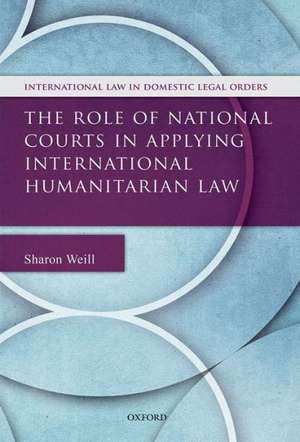The Role of National Courts in Applying International Humanitarian Law: International Law and Domestic Legal Orders
Autor Sharon Weillen Limba Engleză Hardback – 5 mar 2014
Preț: 861.29 lei
Preț vechi: 1239.98 lei
-31% Nou
Puncte Express: 1292
Preț estimativ în valută:
164.83€ • 170.28$ • 137.18£
164.83€ • 170.28$ • 137.18£
Carte tipărită la comandă
Livrare economică 15-21 martie
Preluare comenzi: 021 569.72.76
Specificații
ISBN-13: 9780199685424
ISBN-10: 0199685428
Pagini: 242
Dimensiuni: 163 x 240 x 22 mm
Greutate: 0.51 kg
Editura: OUP OXFORD
Colecția OUP Oxford
Seria International Law and Domestic Legal Orders
Locul publicării:Oxford, United Kingdom
ISBN-10: 0199685428
Pagini: 242
Dimensiuni: 163 x 240 x 22 mm
Greutate: 0.51 kg
Editura: OUP OXFORD
Colecția OUP Oxford
Seria International Law and Domestic Legal Orders
Locul publicării:Oxford, United Kingdom
Recenzii
The book is thoroughly researched and unquestionably timely, and will appeal to scholars of IHL and international law, as well as those with an interest in the judicial function and the interaction of different legal regimes. Military lawyers, international and domestic judges, and the legal advisers of non-governmental and inter-governmental organizations will also be richly rewarded by reading this book.
Sharon Weill pursues her aim to deconstruct and contextualize national court decisions stringently. She reveals a clear position of what courts should legitimately do when deciding in the context of armed conflicts... Thus the book is thought provoking.
This unique and important study explores the complexity of international humanitarian law when it is implemented by national courts. As Sharon Weill explains, sometimes the national judiciary acts as little more than an apologist while sometimes it makes an inspired contribution to the protection of the most vulnerable during times of armed conflict. Too often, simple or simplistic answers are presented to the problems that arise in this area, but not in this thought-provoking study.
. . .Sharon Weill's book is a timely addition to the growing academic literature on the interaction between domestic courts and international humanitarian law. . . In addition to providing an important contribution to the literature - a theoretical framework by which to better understand and assess domestic international humanitarian law cases - Weill's book has creaked opened the door for further academic study. . . Weill should be commended for her efforts.
Sharon Weill pursues her aim to deconstruct and contextualize national court decisions stringently. She reveals a clear position of what courts should legitimately do when deciding in the context of armed conflicts... Thus the book is thought provoking.
This unique and important study explores the complexity of international humanitarian law when it is implemented by national courts. As Sharon Weill explains, sometimes the national judiciary acts as little more than an apologist while sometimes it makes an inspired contribution to the protection of the most vulnerable during times of armed conflict. Too often, simple or simplistic answers are presented to the problems that arise in this area, but not in this thought-provoking study.
. . .Sharon Weill's book is a timely addition to the growing academic literature on the interaction between domestic courts and international humanitarian law. . . In addition to providing an important contribution to the literature - a theoretical framework by which to better understand and assess domestic international humanitarian law cases - Weill's book has creaked opened the door for further academic study. . . Weill should be commended for her efforts.
Notă biografică
Dr Sharon Weill is an international lawyer specializing in international humanitarian law. Her particular field of interest is the relationship between international and domestic law and the judicial enforcement mechanism of international law at a national level. In this context, she conducted a number of field researches in Israel and Palestine (most notably in the Israeli military courts in the Occupied Palestinian Territories) and in the Balkans (Serbian war crimes chamber). In parallel to her academic work, Dr Weill gives seminars on a regular basis for NGOs practitioners. She writes reports for NGOs and media, and has worked with the UN fact finding mission into the Gaza conflict in 2010.







